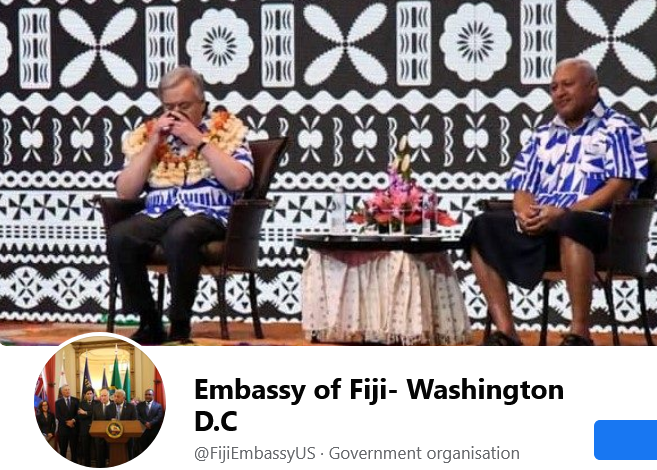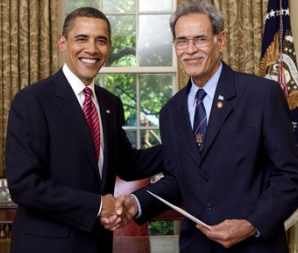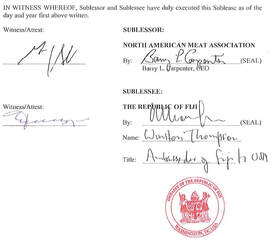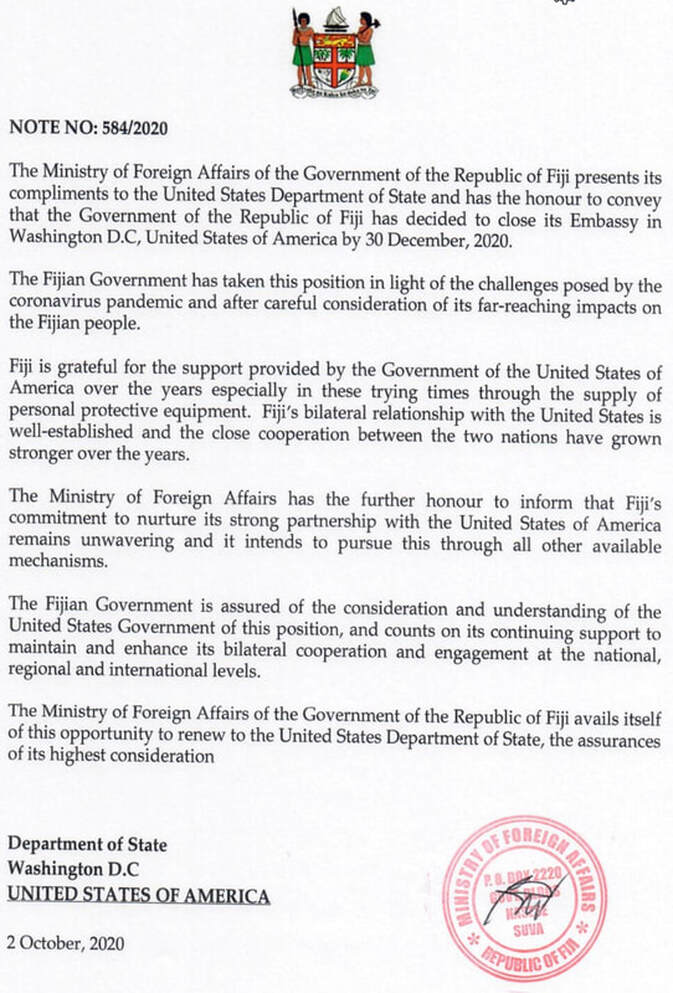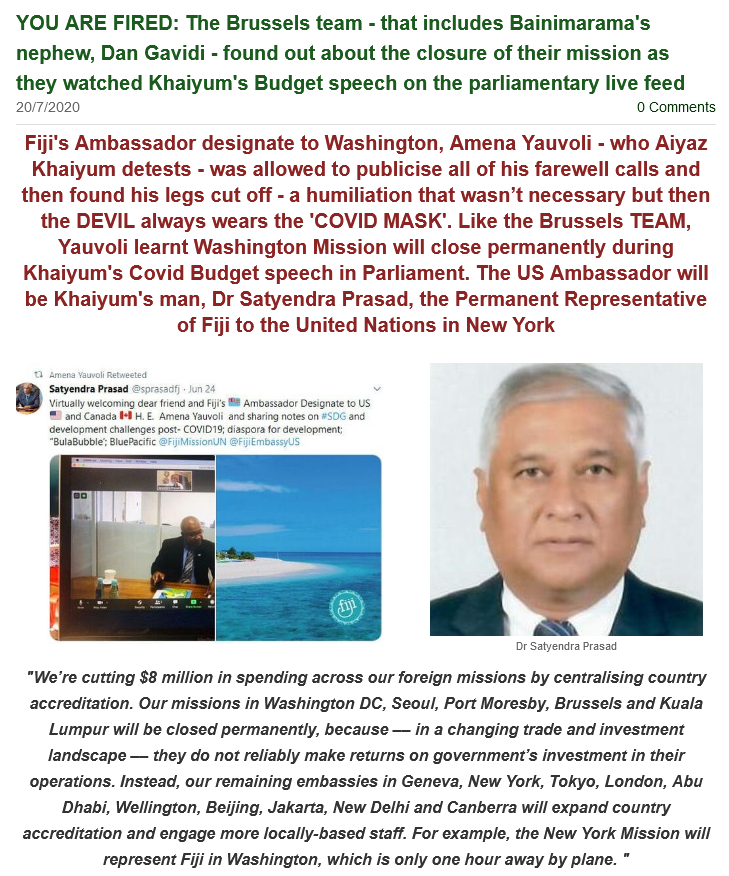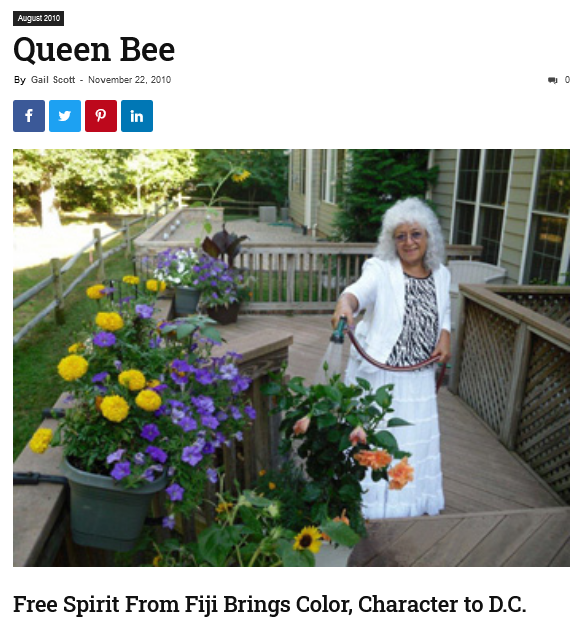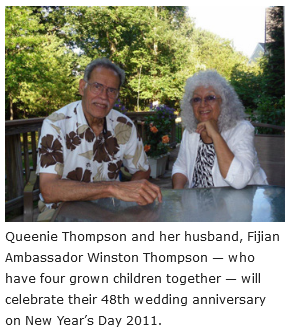The imbecile Finance Minister and walter mitty lawyer was told by the American sublessee of the building that Fiji has to pay $1.5million to terminate the lease which does not expire until 30 April 2024. This week he was lecturing Adi Litia Qionibaravi in Parliament (now shut down due to the Indian Covid variant Fiji Airways brought to Fiji on 10 April).
Aiyaz Khaiyum: 'Leasing Fiji Airways planes is not like you are just taking a hire purchase item from Courts, and you can't just get a plane in, return it later as there are lease agreements.'
The imbecile Finance Minister and walter mitty lawyer was told by the American sublessee of the building that Fiji has to pay $1.5million to terminate the lease. So, he is just keeping the office due to the fact he cannot terminate the lease contract without paying the penalty (remaining months lease) until the end of the contract.
Fijileaks has a copy of the original lease:
* On 14 October 2014 Fiji's ambassador to Washington Winston Thompson signed a sublease agreement on behalf of the Republic of Fiji (Sublessee) with NORTH AMERICAN MEAT ASSOCIATION (Sublessor), a district of Columbia not for profit corporation, with an office address at 1150 Conneticut Avenue. On 29 May 2013, L STREET LLC, the 'Prime Landlord' leased to the North American Meat Association approximately 2,759 rentable square feet on the 2nd floor of the building at 1707 L Street, N.W (Suite 200), Washington, DC.
*The term of the sublease commenced on 1 February 2015 and was to expire at 11.59 on 30 April 2024. |
Queenie is her name — and yes, that’s her real name. And as catchy and unusual as it is, her name is not the only thing that distinguishes this wife from other spouses in the D.C. diplomatic corps. Queenie Thompson, wife of Fiji Ambassador Winston Thompson, is a colorful, nonstop storyteller who loves to regale others with the unique history and legendary traditions of her homeland — a group of volcanic islands in the South Pacific lying about 1,100 miles north of New Zealand.
“I am named after my father’s sister, Queenie, who helped my father deliver me amidst bombs and gunfire during the Japanese occupation of the Gilbert Islands during World War II, only a few days after her own birthday in October 1942,” Queenie explained. “I was born on a small atoll called Butaritari, which was part of the Gilbert and Ellice Islands, now called Kiribati. We were evacuated to Fiji after the liberation by the U.S. Marines during what I am told was a real bloodbath. We never went back.
“Both my grandfathers were German and one of my grandmothers was Marshallese and Portuguese,” she continued. “My one grandfather had a huge walrus moustache. He had left home at 17 because his family wanted him to be a doctor, but he couldn’t stand the sight of blood so he got on a ship and, months later, landed in the Marshall Islands,” she recalled, noting that her youngest granddaughter is named Winta Queenie, in honor of her father Winston and herself.
Just talking about her own name led Queenie to the story of Mary Davis Wallis, the pious and eccentric wife of the daring Yankee sailing captain Benjamin Wallis who accompanied her husband on his Fiji route from 1844 to 1849. Writing about her experiences in her 1851 book, “Life in Feejee, or, Five Years Among the Cannibals,” she detailed native life, including gory descriptions of cannibalism.
“She became so famous at home that people started naming their daughters after her, only we spell it as one word, ‘Merewalisi.’ I often meet girls today who have that name but no idea why,” said Queenie, who delights in filling them in on their namesake.
I was ready to leave the uncomfortable topic of cannibalism when Queenie launched into the famed demise of Rev. Thomas Baker, an English Christian missionary who met a terrible fate with tribespeople in 1867.
“They ate all of Rev. Baker except for his tough boots,” she said, matter-of-factly. “In those days in the 1700s and 1800s, the village chiefs would kill for power, thinking that they would gain that person’s power themselves,” she explained. And that was the risk well-meaning missionaries and nervy ship captains took when they sailed to find a passage to India and went ashore on these picturesque islands. “Once Christianity came in the mid-19th century, that period was over and there were laws against cannibalism,” Queenie said. “Of course, that’s a long time ago.”
Back in November 2003, Baker’s descendants in England were invited by the current chief to visit that very same village for an official apology. The then Fijian Prime Minister Laisenia Qarase joined the tribal ceremony that the chief and his people desperately hoped would break a chain of bad luck the village has suffered ever since that fateful day in July 1867 when, as the story goes, “they ate everything but his boots.” In fact, you can still see the remnants of one of those leather boots in a Fiji museum.
Queenie has her own native display of sorts at her official residence in a manicured cul-de-sac in Vienna, Va. — which she calls her “Fiji Room.” On one side are gorgeous coffee table books of the island’s natural beauty and its new Pure Fiji Spa, which offers banana leaf wraps and warm seashell massages featuring Fiji honey, coconut, papaya and passionflowers. And then smack-dab on another side of the room are huge reproductions of the handmade utensils made for flesh eating. It may be a queasier aspect of Fiji’s history, but it’s not one that Queenie shies away from.
In comparison to his wife’s easy and warm storytelling abilities on any topic, Ambassador Thompson is more reserved — perhaps fitting given his background as the former head of Telecom Fiji Ltd. and a secretary in many different cabinet positions. Ever the diplomat, Thompson also preferred not to discuss Fiji’s history of military coups — including a widely condemned coup d’état staged by Cmdr. Frank Bainimarama, head of the Fiji Military Forces, in December 2006 that has put the island nation at odds with some of its bigger neighbors, including Australia and New Zealand.
Both countries have urged Bainimarama — who has instituted a series of repressive measures since coming to power — to return to civilian rule as soon as possible, but he has said elections will not be held before 2014.
In the meantime, Thompson says Prime Minister Bainimarama is pressing ahead with a five-year “People’s Charter” to equally integrate all ethnic groups as an answer to civil unrest, along with efforts to increase tourism despite Fiji’s remote location and help it recover from a devastating January 2009 flood. Bainimarama is also pushing the nation of 850,000 to embrace emerging markets such as information and communications technology and the film industry.
Having gained its independence in 1970, after nearly a century of British rule, Fiji became a republic in 1987 and is still a member of the British Commonwealth.
According to the ambassador, it is these vestiges of British heritage that have always made military service a natural option for Fijians who wanted to serve their country and see the world. In fact, per capita, more Fijian troops are involved in peacekeeping missions than any other country in the world. “Military service is part of our tradition as a former British colony who was involved in World War I and II … and as a member of the Commonwealth who defended the Malay Peninsula, also a British Colony, from the Communists in 1952,” he said.
Fiji though could have belonged to the Americans if not for a strange quirk in history, according to the ambassador.
“Fiji owed America a lot of money after one Fourth of July in 1854, when the fireworks started a fire that burned down the thatched buildings that had served as the American Consulate,” he said. “Our people helped move out all the furniture and office equipment from the consulate but instead of placing everything a safe distance away, they loaded everything into their outrigger canoes and sailed off into the night. Chief [Seru Epenisa] Cakobau was accused of owing the U.S. government 45, 000 British pounds. The Fiji government offered the islands in trade for the debt but the Americans turned them down!” Years later, Britain settled into the new colony, paying the United States for the privilege.
Today, many British and Americans alike take up the privilege of visiting this scenic country, more often associated with stunning beauty than political strife. “Fiji’s pristine nature, distinct culture, rich history and archaeological importance will always bring people to these beautiful islands and make them wonder just how these mostly volcanic rocks became inhabited,” Thompson said.
Locally, Fiji was featured in this summer’s Smithsonian Folklife Festival on the National Mall, although Queenie wishes that people knew more about her country, beyond the fact that it’s a source for Fiji Water! (“Yes, it does come from Fiji,” she promises.)
“Too often they confuse Fiji with Mount Fuji,” she said. “Several times I’ve gotten Christmas cards in late January that were supposed to be delivered before Christmas because they got routed to Mount Fuji instead!
“Most Americans know at least where Fiji is…. That’s delightful because I can see interest awaken in their eyes,” she added, noting that she often refers curious friends to the embassy’s website. “We are small in size, but big in heart and aspirations for growth.”
“I couldn’t do it without her,” the ambassador said of his wife’s support in Washington. “These sorts of jobs are incomplete without a spouse … helping to maintain the home environment while reaching into the community where you wouldn’t have otherwise made contacts are irreplaceable assets.”
Queenie’s philosophy about living abroad is a complement to her open, good-natured spirit. “I try to live in the present, just where I am at that moment. Winston’s posting to Washington is awfully special as this gives us the opportunity to keep Fiji visible. Living here is like a huge learning curve in my university of life … with diplomatic life being another lesson, an experience to embrace with all its complications and diversity.”
She loves Washington with all its vistas and thick tree cover, and especially enjoys visiting its monuments, museums, art galleries and historic homes. “The city is absolutely stunning in its architecture and physical layout,” Queenie said, noting that in her spare time she loves gardening, practicing tai chi, playing Mahjong, reading and volunteering.
“One of our favorite projects here, including the ambassador and his staff, is the Embassy Adoption Program of the D.C. Public Schools in partnership with Washington Performing Arts Society,” she explained. “Working together with sixth-graders has been invaluable; we learn the student perspective. How better to sustain global peace and understanding than together with our children of the world? I am excited that we will engage with a new school this fall but at the same time we will treasure our memories of Jefferson Middle School.”
Back in Fiji while her husband tends to business, Queenie will meet with several volunteer groups to plan upcoming events and community endeavors, including a project that borrows from the television campaign “It’s 10 p.m. Do You Know Where Your Children Are?”
“We do it nightly, year-round, because with increased tourism there will be more nightlife and more problems with our children,” Queenie said, crediting American volunteerism with inspiring her.
Queenie’s own devotion to children stems from her ever-growing family. Today, the couple’s two daughters, two sons and six grandchildren live all over the world.
Two days after our interview, Queenie and her husband — who on New Year’s Day 2011 will celebrate their 48th wedding anniversary — took off on an Air Pacific non-stop flight from Los Angeles for a two-week visit to Fiji, loaded with presents for their extended brood.
From the Nadi International Airport on Fiji’s largest island, Viti Levu, where the capital of Suva is located, they drive three and a half more hours before they finally arrive at their home, after 28 hours of travel.
But they return to an empty nest in Fiji, just as they do here. Daughter Amanda, 48, is a librarian in Auckland, New Zealand; she and her husband, an engineer, have a 15-year-old boy and a 12-year-old girl. Queenie’s younger daughter Lisa and her husband, an Irish-Hungarian-Native American, live near Peekskill, N.Y. Son David, 46, is an IT consultant and married to Fanny, a Pepsi IT projects manager, who is from the Dominican Republic; they have four daughters, ages 19 to 8. Incidentally, Queenie’s youngest son, Robert Thompson, 32, is regional director of Tahiti Tourisme because, according to his mother, “after his internship with the Fiji Visitors Bureau didn’t lead to full-time employment, Tahiti snapped him up!” His partner Michael is a chef whose family lives in Abu Dubai.
“Skype and the Internet are my umbilical cords,” Queenie said. “We even read bedtime stories to our youngest granddaughter by Skype. We get two copies of each book, one for us and one for her.”
Time with family is paramount, especially “making memories” by traveling together on a train. “As each grandchild reaches their teens, we research together a special train trip for them to take with Papa and Paima, their nicknames for us,” Queenie explained. “We traveled on the Tranz Rail in New Zealand, the Ghan in Australia, European trains while we were living in Geneva, the Bullet Train in Japan, and after living in Dobbs Ferry, New York, we took Amtrak across America.”
While her husband collects sculptures and carvings of turtles wherever they go, Queenie loves to add to her teapot collection (she already has 100 full-size teapots, depicting everything from thatched cottages to a couple dancing across a ballroom floor), as well as to her collection of thimbles (“Yes, I still sew!”) and little bells. (“I adore their happy sound.”)
“My granddaughters and I always have pretend tea parties and now, for those who are old enough, I’m letting them choose the teapots they would like to keep for themselves.”
As much as she misses her family, Queenie does everything she can to “fully commit to all these new experiences abroad. I’m so grateful to have my Fiji life and my Washington life, a New York life, a Sydney life and an Auckland life. These experiences are all about my evolution,” she said. “I love change.”
About the Author
Gail Scott is a contributing writer for The Washington Diplomat and lifestyle columnist for the Diplomatic Pouch.

